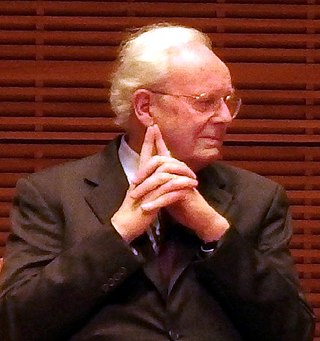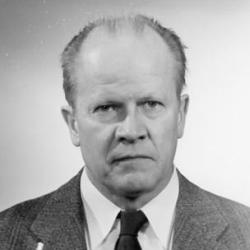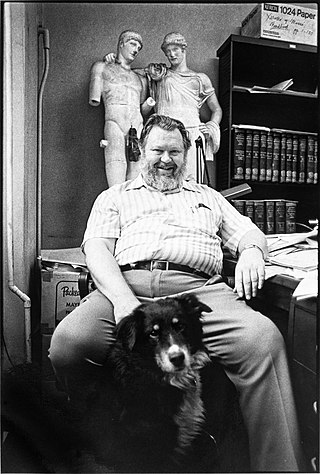Related Research Articles

William Payne Alston was an American philosopher. He is widely considered to be one of the most important epistemologists and philosophers of religion of the twentieth century, and is also known for his work in metaphysics and the philosophy of language. His views on foundationalism, internalism and externalism, speech acts, and the epistemic value of mystical experience, among many other topics, have been very influential. He earned his PhD from the University of Chicago and taught at the University of Michigan, Rutgers University, University of Illinois, and Syracuse University.
William Appleman Williams was one of the 20th century's most prominent revisionist historians of American diplomacy. He achieved the height of his influence while on the faculty of the department of history at the University of Wisconsin–Madison and is considered to be the foremost member of the "Wisconsin School" of diplomatic history.
Lloyd C. Gardner is an American historian, a member of the "Wisconsin School" of diplomatic history along with Walter LaFeber and Thomas J. McCormick. He was educated at the University of Wisconsin–Madison.

Walter Fredrick LaFeber was an American academic who served as the Andrew H. and James S. Tisch Distinguished University Professor in the Department of History at Cornell University. Previous to that he served as the Marie Underhill Noll Professor of History and a Stephen H. Weiss Presidential Fellow at Cornell.
Stephen Mack Stigler is the Ernest DeWitt Burton Distinguished Service Professor at the Department of Statistics of the University of Chicago. He has authored several books on the history of statistics; he is the son of the economist George Stigler.
Philip Taft (1902–1976) was an American labor historian whose research focused on the labor history of the United States and the American Federation of Labor.
Thomas J. McCormick was an American academic who was emeritus professor of history at the University of Wisconsin–Madison, the same place he got a Ph. D. where he succeeded William Appleman Williams and continued the groundbreaking work of the so-called Wisconsin School of diplomatic history. Indeed he is considered one of the core members of the Wisconsin School, along with Williams, Walter LaFeber, and Lloyd Gardner. He has used Immanuel Wallerstein's world-systems approach to describe the dynamics of hegemony in US diplomatic history and also studied US corporatism.

Lauriston Sharp was a Goldwin Smith Professor of Anthropology and Asian Studies at Cornell University. He was the first person appointed in anthropology at the university, and he created its Southeast Asia Program, research centers in Asia and North and South America, a multidisciplinary faculty and strong language program. He was a founding member of the Society for Applied Anthropology and a founding trustee of the Asia Society.
Laura Dassow Walls is an American professor of English literature and currently the William P. and Hazel B. White Professor of English at the University of Notre Dame.
Everett Carll Ladd Jr. was an American political scientist based at the University of Connecticut. He was best known for his analysis and collection of public opinion polls. He directed the Roper Center for Public Opinion Research at the University of Connecticut; the Center's mission is to collect and preserve the reports and the original raw computerized data of polls and surveys since the 1930s. At his death, he had amassed 14,000 surveys from many countries. He was also an expert on the opinions and careers of social scientists.
Suzanne M. Desan is an American historian. She is the Vilas-Shinner Professor of History at the University of Wisconsin-Madison, and the author or editor of four books on French history.
The Wisconsin School of American diplomatic history is a school of thought that emerged from the history department of the University of Wisconsin in the 1950s and 1960s. The school, exemplified by the work of William Appleman Williams and also including as core members Walter LaFeber, Thomas J. McCormick, and Lloyd Gardner, generally holds that economic reasons, and the desire for increased markets abroad, were the driver behind much of American foreign policy and the creation of an American empire during the 19th century. These beliefs – which consigned to subordinate status other possible explanations such as morality, security, and balance-of-power calculations – have been referred to as the "Open Door Interpretation", in reference to the Open Door Notes of 1899 and 1900.

Robert Earl Kaske was an American professor of medieval literature. He spent most of his career at Cornell University in Ithaca, New York, where he was the Avalon Foundation Professor in the Humanities, and where he founded one of the preeminent medieval studies graduate programs in North America. His published output included lengthy interpretations of Beowulf, and of poems and passages by Dante and Chaucer, and frequently constituted leading studies. Kaske particularly enjoyed solving cruxes, with articles on problematic passages in works such as Pearl, Piers Plowman, the Divine Comedy, "The Husband's Message", "The Descent into Hell", and Beowulf.
Robert Green McCloskey was an American political historian.
This is a select bibliography of post-World War II English-language books and journal articles about Stalinism and the Stalinist era of Soviet history. Book entries have references to journal reviews about them when helpful and available. Additional bibliographies can be found in many of the book-length works listed below.
Paul A. Knaplund was a Norwegian-American professor of history at the University of Wisconsin–Madison. He specialized in the history of the British Empire.
Elizabeth DePalma Digeser is an American scholar of Ancient Roman history, with an emphasis on late antiquity. After earning a B.A. in Psychology at the State University of New York at Buffalo in 1981 and a M.A. in Psychology at the Johns Hopkins University in 1983, she moved to the University of California, Santa Barbara where she earned her Ph.D. in History (her dissertation entitled “Lactantius, Constantine, and the Roman "Res Publica"" was directed by Harold A. Drake.
Helena Mary Pycior is an American historian known for her works in the history of mathematics, Marie Curie, and human-animal relations. She is a professor emerita of history at the University of Wisconsin–Madison.
Robert Edward Norton is an American cultural and intellectual historian who specializes in European, and especially German, history and thought from the Enlightenment to the early twentieth century.

James Morton Smith was an American historian and educator who served as director of the Wisconsin Historical Society from 1970–1976 and director of Winterthur Museum, Garden and Library from 1976–1984. He received a Guggenheim Fellowship and a fellowship from the American Council of Learned Societies, both in 1960.
References
- ↑ Thomas J. Archdeacon. University of Wisconsin–Madison. 468. Retrieved 3 September 2019.
- ↑ Thomas J. Archdeacon. John Simon Guggenheim Memorial Foundation. Retrieved 3 September 2019.
- ↑ Pohl, T. W. (1 April 1978). "Thomas J. Archdeacon, "New York City, 1664-1710: Conquest and Change" (Book Review)". Journal of Historical Geography. 4 (2): 209–210. doi:10.1016/0305-7488(78)90202-5.
- ↑ Breen, T. H. (1976). "New York City, 1664–1710: Conquest and Change Archdeacon, Thomas F.: Ithaca, N.Y.: Cornell University Press, 197 pp., Publication Date: February 15, 1976". History: Reviews of New Books. 4 (6): 121. doi:10.1080/03612759.1976.9946146.
- ↑ Papenfuse, Edward C. (1 March 1980). "New York City, 1664–1710: Conquest and Change. By Thomas J. Archdeacon. (Ithaca: Cornell University Press, 1976. 197 pp. Maps, tables, charts, notes, essay on sources and methods, bibliography, and index. $9.75.)". Journal of American History. 66 (4): 907–909. doi:10.2307/1887655. JSTOR 1887655.
- ↑ Gleason, Philip (1 March 1984). "Becoming American: An Ethnic History. By Thomas J. Archdeacon. (New York: Free Press, 1983. xix + 297 pp. Charts, tables, notes, essay on sources, and index. $17.95.)". Journal of American History. 70 (4): 865–866. doi:10.2307/1899755. JSTOR 1899755.
- ↑ Igartua, José E. (June 1997). "Correlation and Regression Analysis: A Historian's Guide by Thomas J. Archdeacon (review)". The Canadian Historical Review. 78 (2): 370–372.